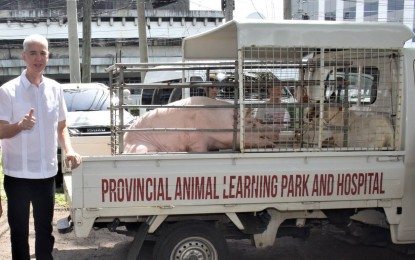
MAIDEN RELEASE. Negros Occidental Eugenio Jose Lacson leads the maiden dispersal of locally produced breeder swine at the capitol grounds in Bacolod City on Monday (June 24, 2024). It is being implemented under the Provincial Swine Industry Recovery Initiatives and Animal Genetic Improvement and Livelihood Program. (Photo courtesy of Negros Occidental-PIO)
BACOLOD CITY–The Negros Occidental provincial government has started distributing locally produced breeder swine for herd repopulation after losing thousands of hogs to transboundary animal diseases in the past year.
The swine dispersal, which started on Monday, is the first since the massive hog deaths in 2023 that affected almost 18,000 pigs in 20 local government units across the province.
Data from the Provincial Veterinary Office (PVO) on Tuesday showed seven groups of beneficiaries received a total of 10 boars and gilts under the Provincial Swine Industry Recovery Initiatives and Animal Genetic Improvement and Livelihood Program.
In his message, Governor Eugenio Jose Lacson acknowledged the efforts of the PVO in working with the swine raisers for the local hog industry to recover.
“This is the first step in our repopulation. I want to emphasize that we encourage the use of artificial insemination. Before, we used commercial or traveling boar, which was one of the reasons that the ASF (African swine fever) virus spread,” he added.
According to the PVO, adopting artificial insemination in swine breeding would produce healthy swine and avoid the risk of transboundary animal diseases.
Dr. Ryan Janoya, PVO Officer-in-Charge, said for the first time, the provincial government dispersed breeder pigs produced by the Swine Breeding Farm at the Negros First Ranch in Sta. Rosa, Murcia.
“This is a significant occasion, especially for the swine industry. This is the first swine dispersal activity after the transboundary animal disease outbreak experienced by the province. This is also the first dispersal from the swine breeding project,” he added.
Janoya urged swine raisers to be vigilant and to continue practicing biosecurity measures for the hog industry to recover fully.
“Let us continue to be vigilant. As we have said, the rainy season has started. Given the reputation of the ASF virus, it has high resilience and can survive in such an environment,” he said. (PNA)
 The Philippine News Agency is a web-based newswire service of the Philippine government under the supervision of the News and Information Bureau (NIB) of the Presidential Communications Office (PCO).
The Philippine News Agency is a web-based newswire service of the Philippine government under the supervision of the News and Information Bureau (NIB) of the Presidential Communications Office (PCO).